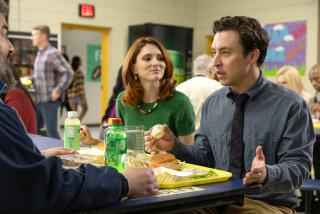‘Minds’: School Tale as About as Exciting as Study Hall
In “Dangerous Minds,” a determined but inexperienced white teacher turns around a classroom of hostile, mostly Latino and African American kids by bucking the bureaucracy, introducing them to poetry and to an authority figure who cares. (Rated R)
*
Manuel Berry, an Irvine father who attended high schools in Compton and Watts, thought his children might appreciate this movie about inner-city kids who can escape a rough environment when a teacher makes the effort to reach out to them. “I grew up in an era when schools were like that,” he said.
But his boys, who don’t go to schools like that, were disappointed and bored.
“I thought it was a dud,” said Mourice, his 16-year-old son who attends Woodbridge High School. “It was like another ‘Stand and Deliver.’ It was almost the exact same thing. It wasn’t as good, though.”
“Stand and Deliver” told the real-life story of Jaime Escalante, a math teacher in East Los Angeles. Similarly, “Dangerous Minds” is based on an autobiographical book by LouAnne Johnson, a Marine who taught in Belmont.
The high school, short of funds and school supplies but long on petty regulations, is burnout central for teachers, a dank world overrun with graffiti and hormones.
“They tried too hard to make it violent and to make little crying scenes out of it. You don’t need all that,” Mourice said.
If he were a teacher, he said, he’d give the movie a D.
Other kids might appreciate the movie’s lighter moments, such as the in-the-teacher’s-face high school high jinks, or scenes from an amusement park where Johnson (Michelle Pfeiffer) has taken them as a reward for learning poetry. Or they might just appreciate Pfeiffer and her cheap chic wardrobe.
But Mourice’s brothers panned the movie too. “It didn’t have any adventure,” said 8-year-old Eric. “There was nothing good in it, really.”
Even 4-year-old Woodrow gave it a small thumb down. The only thing he liked about it was the rap music score, he said.
Still, those less resistant to sappy, inspirational teacher movies might bring a hankie or two. Getting the kids’ interest with pop poetry, Johnson leads them to draw their own comparison between Bob Dylan’s lyric, “I will not go down because someone tells me death is coming round” with Dylan Thomas’ “Do not go gentle into that good night.”
In turn, she learns why kids fight to save face and why some parents don’t want their kids “saved” by a “white bread [expletive].”
The movie contains rough language and one locker room fistfight, but avoids on-screen fatalities and sex beyond smooching.
Chelsea Namking, 12, of Irvine found the movie “interesting” particularly how the students “got interested and didn’t blow her [the teacher] off. They paid attention and stuff.”
To her, this seemed plausible. To Mourice, it bordered on the ridiculous.
Said Mourice: “Teachers can be like that, but, I mean, that one teacher’s going to come in and change a classroom full of people in one semester? It’s not going to happen.”
More to Read
Only good movies
Get the Indie Focus newsletter, Mark Olsen's weekly guide to the world of cinema.
You may occasionally receive promotional content from the Los Angeles Times.










